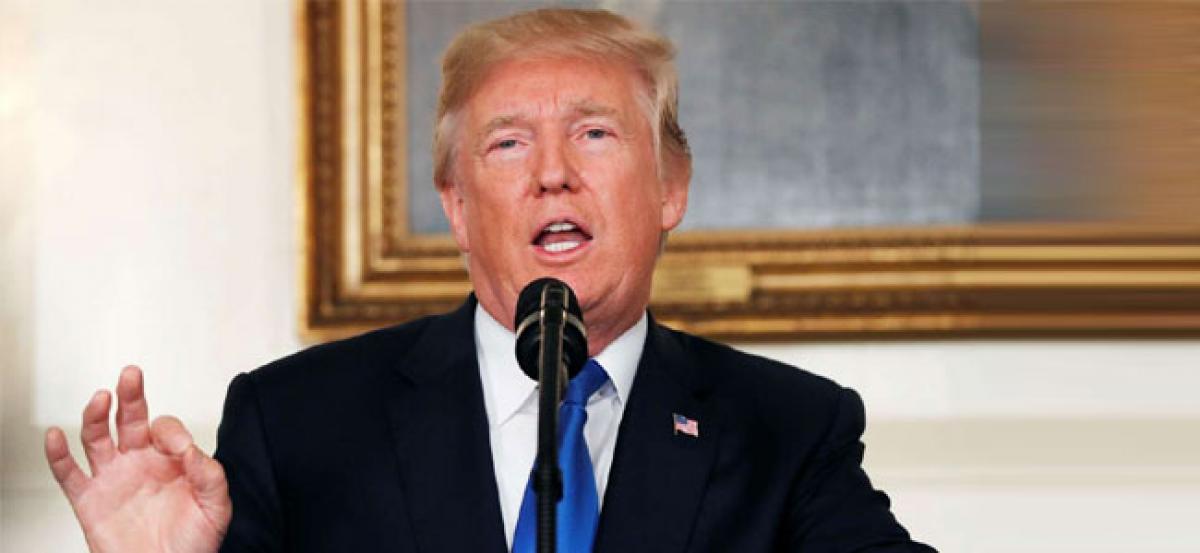Live
- YSRCP, TDP candidates file nominations
- Gold rates in Delhi surges, check the rates on 20 April 2024
- Gold rates in Visakhapatnam surges, check the rates on 20 April 2024
- Gold rates in Vijayawada surges, check the rates on 20 April 2024
- Gold rates in Hyderabad surges, check the rates on 19 April 2024
- YS Sharmila to file nomination for Kadapa Lok Sabha constituency today
- Rains lash parts of Hyderabad bringing respite from heat
- Peddireddi continues tirade against former CM Kiran
- DCA raids three quacks
- ‘Kuppam Gadda-TDP Adda’, asserts Bhuvaneswari
Just In

The United States aims to cripple Irans economy further with sanctions it is reimposing this week, administration officials said on Monday, but Irans leader said economic pressure alone would not force Tehran to the negotiating table
The United States aims to cripple Iran's economy further with sanctions it is reimposing this week, administration officials said on Monday, but Iran's leader said economic pressure alone would not force Tehran to the negotiating table.
The so-called snapback sanctions, due to come into force early on Tuesday, will target Iranian purchases of US dollars, metals trading, coal, industrial software and its auto sector.
Foes for decades, the United States and Iran have been increasingly at odds over Iran's growing political and military influence in the Middle East since Trump took office in January 2017. The sanctions now being brought back were among those lifted under a 2015 deal between world powers and Tehran on curbing Iran's nuclear program. Iran's rial currency has lost half its value since April under the threat of revived US sanctions.
The currency's collapse and soaring inflation have sparked sporadic demonstrations in Iran against profiteering and corruption, with many protesters chanting anti-government slogans.
US President Donald Trump, who abandoned the nuclear deal in May, is aiming to cut off the Iranian leadership's access to resources, officials said. White House national security adviser John Bolton, who advocates a hard line against Iran, said on Monday Tehran should take up a recent offer from Trump to negotiate.
"They could take up the president's offer to negotiate with them, to give up their ballistic missile and nuclear weapons programs fully and really verifiably," Bolton told Fox News. "If the ayatollahs want to get out from under the squeeze, they should come and sit down. The pressure will not relent while the negotiations go on," he said.
But President Hassan Rouhani on Monday said Iran could hold talks with the United States only if Washington proved its trustworthiness. "We are always in favor of diplomacy and talks ... But talks needs honesty ... The U.S. reimposes sanctions on Iran and pulls out of the nuclear deal, and then wants to hold talks with us," Rouhani said in a speech broadcast live on state television.
"Trump's call for direct talks is only for domestic consumption in America ... and to create chaos in Iran." SANCTIONS WEAK SPOTS The U.S. sanctions strategy has several weak spots, especially a reluctance by Europe and China to curtail business with Iran. The European Union voiced regret on Monday at the looming U.S. sanctions.
The United States also plans to re-introduce potentially more damaging sanctions on Iranian oil in November and wants as many countries as possible to cut their imports of Iranian oil to zero. But a senior official at Iran's economy ministry said Tehran did not think the economic impact of the sanctions would be massive.
"Many countries, including Europeans, disagree with the U.S. sanctions and are willing to work with Iran," said the official, who asked not to be named. Iran said on Sunday it will ease foreign exchange rules, in a bid to halt the fall of its currency.
Iran's net official reserves declined to $110.7 billion in the 2016/17 fiscal year and are projected to decline further this year to $97.8 billion, enough to finance about 13 months of imports, the International Monetary Fund estimated in March.
The sanctions aim to modify Iran's behavior and not bring about a "regime change" targeting Rouhani, U.S. officials said on a conference call on Monday. They said the government's handling of social and labor protests was a concern. Fear of sanctions and economic hardship have led to sporadic protests in several cities in recent days, with ordinary Iranians chanting slogans against Iranian leaders.
One U.S. official said the administration was deeply concerned about reports of violence against unarmed citizens. "The United States supports the Iranian people's right to peacefully protest against corruption and oppression without fear of reprisal," the official added.
Trump warned on Monday of "severe consequences" for people or entities that fail to wind down economic activities with Iran.
"The United States is fully committed to enforcing all of our sanctions, and we will work closely with nations conducting business with Iran to ensure complete compliance," he said in a statement.
The European Union vowed on Monday to counter the renewal of sanctions on Iran. The EU and other parties to the 2015 nuclear deal, China and Russia, are working to maintain trade with Iran, which has threatened to stop complying with curbs on its nuclear work if it fails to see the economic benefits of relief from sanctions under the deal. "We deeply regret the reimposition of sanctions by the U.S.," the bloc said in a joint statement with the foreign ministers of France, Germany and Britain. They pledged to work on preserving financial flows and Iran's oil and gas exports - a lifeline of its economy.

© 2024 Hyderabad Media House Limited/The Hans India. All rights reserved. Powered by hocalwire.com







